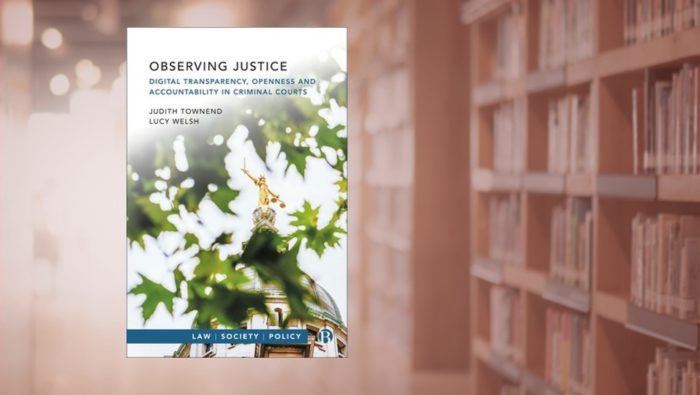
In Search for Open Justice in Digital Criminal Processes

In their recent book Observing Justice: Digital Transparency, Openness and Accountability in Criminal Courts, Judith Townend and Lucy Welsh urge us to rethink existing approaches to open justice in the criminal courts. Open justice is the application of provisions for transparency in the justice system that ensures the judiciary, the executive and other decision-making actors are held to account for the way in which justice is delivered (p.5). In relation to digital courts, the authors focus on three key open justice principles which they argue need to be re-thought: transparency, accountability, and access to justice.
The authors convince the reader early on in the book that the concept of open justice lacks coherence. They demonstrate this through examples of lower criminal courts. In particular, they focus on how the Single Justice Procedure, audio-visual technology, and the automatic online conviction process reveal complications in their execution. This is discussed through the way that participatory accountability and information transparency have been compromised in the light of the COVID-19 Pandemic. The authors state that not enough attention is being paid to recover these important open justice traits. They argue further that this omission has had a direct effect on the public’s perception of Magistrates’ Court proceedings as well as on the accountability of these processes. Despite intentions of the legislator to ensure open justice in these court proceedings (MoJ 2023), the reality has exposed serious obstacles to transparency, to accountability, and to access. As the authors show, this is particularly evident in virtual hearings. The role of public and media scrutiny, as part of open justice, has been significantly altered. The authors remind us that these are in place (among other things) to help expose judicial incompetence, unfair treatment of participants and inadequate resources (p.125). They advocate for an understanding of open justice that looks beyond the news media for informational transparency and encourages accountability through public participation in the court process: participatory accountability. Through this, open justice can expose and prevent individual and societal harm.
As so often when we conduct research, the authors found a disconnect between the ideal of open justice and its reality. To remedy this, they call for a repositioning of the definition of open justice to reflect the current changing landscape of online processes. To be able to do this, though, more empirical evidence is needed. The authors seek to start to fill this gap by discussing their original qualitative research as indicators of trends and urge the academic community to collect more data on developments in online and hybrid courts. Existing justice systems datasets have gaps due to inconsistencies in their collection, which means they are mostly not useable for rigorous research. This also means that these datasets cannot inform and develop public legal education. For example, the MoJ is offering a data-first service as an attempt to link data that they are collecting, funded by ADR UK. It advocates on their website: ‘This database can be used by accredited researchers for approved research projects that are in the public interest.’ Despite this being a step towards more transparency and access to ‘pruned’ datasets, it remains a big worry and is directly related to the open justice challenge discussed in the book. The authors use the term justice worthiness to describe those characteristics that may be distinct from the potential newsworthiness (receiving media and public attention) of a case. For example, information about participants’ resources and legal representation and the largely alienating video technology in criminal courts (p. 125). These important issues, the authors concede, ought to be discussed in the public domain as system failures. Accordingly, adequate data needs to be collected in order to design policies to address failures in the system.
This short book provides the reader with an accessible and important discussion of how the concept of open justice has changed with the implementation of online and hybrid processes. To make online processes accessible, transparent, and accountable is one of the most pressing challenges of digital justice systems today. The authors do an excellent job of showing us the challenges the digital criminal justice system faces and how more resources directed at improvements of the three enduring principles (transparency, accountability, and access to justice) are desperately needed. We know from a growing body of literature that the digitalisation of justice processes brings with it many challenges, systemic issues, and a worrying future for public legal education. Now is the time to harness the power of empirical socio-legal research and to collect a strong evidence base for implementing change.

